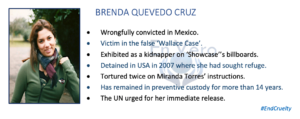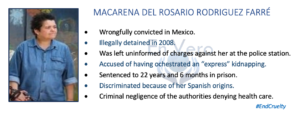Persons in charge of the José Luis Rincón Sanabria’s case: Maria José Espejo assisted by Giuliana Rojas.
Case Summary:
By: Giuliana Rojas Gazco
Translation: Jorge B. (contact here)
Since August 10, 2007, José Luis Rincón Sanabria has been deprived of his freedom serving a sentence of 47 years, 8 months and 6 days for aggravated kidnapping for the purpose of extortion, aggravated theft and attempted aggravated extortion. Although José Luis did not participate in any of these crimes, he has been unjustly sentenced based of the testimony of the true perpetrators who reached an agreement with the Colombian Public Prosecutor’s Office in exchange for testifying against him.
Everything started in Bogota on August 3, 2007, when some individuals dressed in police uniforms entered a house under the excuse of carrying out a search. Once inside the home they proceeded to steal valuables and kept hostages the owner of the house and his family for three hours, demanding the delivery of 500 million Colombian pesos (about Can$ 270,000) in exchange for their freedom. The victims handed over 100 million Colombian pesos (about Can$ 54,000) that same day and promised to deliver the rest on August 10. The family reported the facts to the police and agents of Colombia’s Department of Security or DAS organized an operation to capture those involved in the delivery of the money.
That day José Luis, who was an officer of the Colombian National Police with the rank of second lieutenant and acting as commander of the CAI ANDES (Andes Community Police Station) was patrolling along with two other police officers when they noticed the presence of a suspicious vehicle, whose occupants, after respective identification checks, turned out to be agents of the DAS that were participating in an operation, of which the police had not been made aware. The DAS agents were annoyed by the control to which they were put under since they were only allowed to continue their operation and their patrolling once their identities were established.
Thus, José Luis and his companions found themselves in the middle of this operation, in the wrong place at the wrong time. While they were patrolling, the DAS agents intercepted the vehicles of the suspects who were driving in front of the police patrol. When they stopped to see what was happening, the DAS agents accused José Luis and his companions of having participated in the crime; they arrested them as accomplices and accused them of a crime in flagrante delicto for having escorted the suspects.
Both José Luis and his two companions had irrefutable evidence of where they were on August 3, at the time the suspects had committed the crimes, which clearly demonstrated their innocence. However, this was not enough for the Colombian justice system, since both the sentences by the courts of first and second instance established the criminal responsibility of the police officers, based on the testimony of the true perpetrators, who, protected by the principle of opportunity, negotiated with the Public Prosecutor’s Office to obtain minimum sentences in exchange for “collaborating” with the courts, by testifying against José Luis and the other two police officers.
None of the appeals lodged by José Luis has had any positive results despite evidence of his innocence and the procedural irregularities that took place during the trial, thus undermining his fundamental rights to personal freedom and due process.




